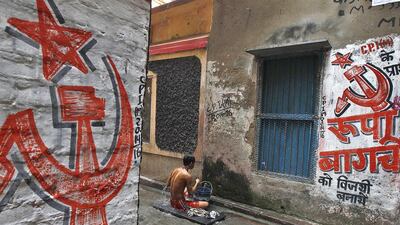NEW DELHI // India’s main communist party has plunged into four days of soul searching after being pummelled in elections in a country that still describes itself as socialist.
The central committee of the Communist Party of India (Marxist), or CPI (M), began its four-day conclave in Delhi on Sunday in a bid to reverse its fortunes.
The biggest blow came in parliamentary elections held this year, when the CPI (M) fielded 93 candidates but won just nine seats.
A decade ago, the CPI (M) had fielded 69 candidates and won 44 seats.
Even in the left’s traditional stronghold of West Bengal, the CPI (M) has shrunk in influence. Apart from having being ousted from the state government in 2011, after 34 years in power, the left – which includes the CPI (M) and other allied communist parties – has regularly been losing local elections in West Bengal.
Only in the north-eastern state of Tripura has the CPI (M) retained its dominance. In assembly elections there last year, the party won a fifth consecutive term in power, sweeping 49 out 60 seats in the legislature.
But the CPI (M)’s overall decline has prompted a search for a new political strategy, a party leader told the IANS wire service last week.
“After finalising the strategy, programmes and party documents in the four-day meeting, these will be placed before the next party congress for its endorsement,” the leader said.
The CPI (M) has plenty of fodder for reflection: its pro-poor image has taken a beating, its leaders are often at odds with one another, and its relevance is frequently called into question as India veers more and more towards pro-market policies.
“The left just lost touch with the poor, whom they were supposed to be championing,” said Buddhadeb Ghosh, a senior fellow at the Institute of Social Sciences, a think tank in Kolkata. “Even after such a long stint in power in West Bengal, for example, their development record was slim.”
Villages remained without electricity. Unemployment rose, industrial production fell, and the quality of education and infrastructure declined or remained stagnant.
Given these conditions, Mr Ghosh said, voters felt let down by the CPI (M)’s “empty emphasis” on how it was the only party that wanted to lift up the poor.
The CPI (M) has also been overwhelmed by the rise of Narendra Modi, the Bharatiya Janata Party (BJP) leader who became prime minister in the general election.
Mr Modi’s ascendance represented two trends the CPI (M) claims to stand against, Prakash Karat, the general secretary of the party, wrote in a party journal in May.
The first is the zealous Hindu nationalism known as Hindutva, antithetical to the CPI (M)’s policy of secularism.
The second involves “a savage attack on welfare measures and the livelihood needs of the vast masses of the working people and the poor in order to serve the interests of a big-business-driven model of development”, Mr Karat wrote.
But the fact that Mr Modi won, despite playing his pro-Hindu, pro-business cards openly, suggests that the CPI (M) is misjudging the mood of the country, said Anil Thampy, who runs a graphic design firm in the town of Thrissur, in Kerala.
The CPI (M) is now in the opposition in that Congress-ruled state, having been unseated from power after losing the assembly elections in 2011.
Mr Thampy’s father and grandfather voted for the CPI (M), and he followed in their footsteps the first couple of times he voted.
But he became frustrated, he said, by how archaic the party’s statements on economics were beginning to sound, particularly when a more liberal economy had brought such evident rewards to India in the 1990s and 2000s.
“It’s like they were well-intentioned, but they were stuck in a rut,” Mr Thampy, 34, said. “I think that’s why Modi won this election this year. People believed that they would be better off with more market- and business-oriented policies, so they voted for Modi even if they weren’t particularly comfortable with Hindutva.”
There have also been reported divisions between Mr Karat and Sitaram Yechury, another party leader. The Indian Express newspaper reported on Monday that Mr Karat and Mr Yechury differed on whether the CPI (M)'s political strategy suffered from grave shortcomings.
Mr Karat and the party’s politburo had formulated a draft report calling for changes in the political line maintained by the CPI (M) since 1978.
But Mr Yechury questioned this stance, the Express reported.
No details were revealed about what changes the politburo had advanced, or what objections Mr Yechury brought up. But the tussle is “the latest incident in the tug of war between [Mr Yechury] and Karat”, the newspaper said.
ssubramanian@thenational.ae

